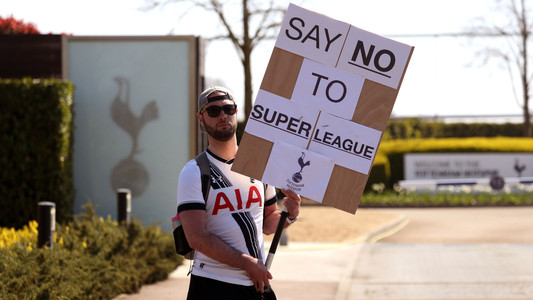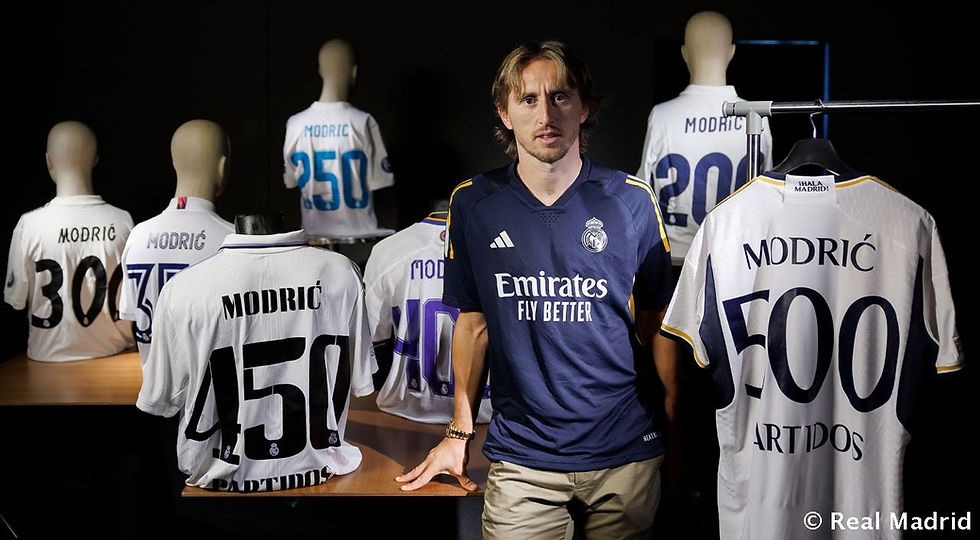The Super League comes into life with many controversies!
- angelsmadridistasf

- Apr 20, 2021
- 5 min read

As the rumors were spreading and everyone was asking what is the Super League, the most important clubs of Europe have really started to move in this direction. They have actually started long ago. After months of secret talks, confirmed their plans late on Sunday. Florentino Perez is declared the chairman of this initiative.
This is the official announcement by Real Madrid:

Twelve of Europe's top football clubs have today announced that they have agreed to form a new competition, the Super League, governed by their Founding Clubs.
AC Milan, Arsenal FC, Atletico Madrid, Chelsea FC, FC Barcelona, FC Internazionale Milano, Juventus FC, Liverpool FC, Manchester City, Manchester United, Real Madrid CF and Tottenham Hotspur have joined as Founding Clubs. Three more clubs will be invited to join before the opening season starts as soon as possible.
The Founding Clubs look forward to future discussions with UEFA and FIFA in order to identify the best solutions for the Super League and for world football as a whole.
The formation of the new league comes at a time when the global pandemic has accelerated the instability of the current economic model of European football. The Founding Clubs have for years aimed to improve the quality and strength of existing European competitions and, in particular, to create a tournament in which the best clubs and players can compete against each other on a more frequent basis.
The pandemic has shown that a strategic vision and commercial approach is needed to increase value and support for the benefit of the football pyramid as a whole. Over the past months, there has been an intensive consultation with the governing bodies on the future format of European competitions. The Founding Clubs believe that the solutions proposed by the regulators do not resolve the fundamental issues, which are both the need to offer higher quality matches and to obtain additional financial resources for the whole world of football.
Format of the competition:
-20 clubs will participate, the 15 Founder Clubs and five additional teams will qualify annually on the basis of the previous season's performance;
-All matches will be played midweek, all clubs will continue to compete in their respective domestic leagues, preserving the traditional fixtures that are at the heart of club life;
-The season will start in August with clubs participating in two groups of ten, playing home and away matches; the top three in each group will automatically qualify for the quarter-finals. The teams finishing fourth and fifth will play an additional two-legged playoff. Following this, two-legged playoffs will take place from the quarter-finals onwards, leading to the final, which will be played as a single match at the end of May at a neutral venue.
As soon as possible following the launch of the men’s competition, a women’s league will be rolled out, which will contribute to the progress and development of the ladies’ game.
This new annual tournament will allow for significantly improved financial growth, which will enable the clubs to support the European game through a long-term commitment and will see the solidarity contributions increase in line with the revenues generated by the new European league. The solidarity payments will be greater than those currently generated by the European club competition system and it is expected that they will exceed €10,000 million during the period that the clubs have committed to. Meanwhile, the new competition will be built on the basis of sustainable financial criteria, with all of the founding members having committed to a spending framework. In exchange for that commitment, the clubs will receive a total one-off payment of €3.5 billion which is for the sole purpose of investing in infrastructure and offsetting the impact of the COVID pandemic.
Real Madrid president and president of the Super League, Florentino Pérez, stated that:
“We’re going to help football at all levels and position it in its rightful place in the world. Football is the only global sport in the world with over 4 billion followers and, as big clubs, our duty is to satisfy the fans’ demands”.
In comments in support of the new European league, Andrea Agnelli, Juventus president and vice-president of the Super League noted that:
“Our 12 founder members represent thousands of millions of fans across the world. We’ve come together at this critical time to bring about a transformation in the European game to give the sport that we love the foundations to make it sustainable in the future by considerably increasing the solidarity payments and giving fans and amateur players a dream and offering games of the highest quality that will feed their passion for football”.
Joel Glazer, Manchester United co-owner and Super League vice-president, declared that:
“By bringing together the best clubs and players from across the world to play against each other for a whole season, the Super League will represent a new chapter for European football, whilst ensuring a competition and facilities of the highest quality and greater financial support across the football pyramid in general”.
But what do fans and other clubs think about this?
Most of the fans and other clubs are against the Super League. There have been many reasons about why there has been so much backlash to the Super League, but the overwhelming issues are that the competition is elitist and exclusionary, removing healthy competition and that the owners of the clubs involved seem to be fuelled only by financial reasons than by a genuine love of the game. On Monday and especially on Tuesday the voices that go against the Super League have been on the increase.
Fans of the six involved Premier League teams were left upset and disappointed by the Super League announcement, having not been informed of the plans. Coaches and players were also not aware of the situation. In the hours following the confirmation of the Super League, fans of the Premier League "Big Six" took to their stadiums to protest the announcement, with Liverpool fans hanging banners and flags outside of Anfield. Chelsea supporters then voiced their concerns at Stamford Bridge in numbers prior to their Premier League game against Brighton. There have not been other protesting activities in other countries like Italy and Spain, but looking at the social medias it is clear that the fans are totally against Super League.
Meanwhile Bayern Munich, Borussia Dortmund and PSG have stated that they have no intention to join the Super League.
AS for the political representatives, Boris Johnson has been openly speaking against this new competition. He has made clear that his government will support the football authorities in taking action against the clubs involved. The British government, which strongly opposes the Super League, has set in motion a revision of how it monitors how football clubs are run in the UK. In Germany, members must own 51 percent of their club.
"If the past year has taught us anything, it's that football is nothing without its fans. These owners should remember that they are only temporary custodians of their clubs, and they forget fans at their peril," said the UK's culture secretary, Oliver Dowden.
"That's why over the past few months I have been meeting with fans and representative organisations to develop our proposals for a fan-led review. I had always been clear that I didn't want to launch this until football had returned to normal following the pandemic. Sadly, these clubs have made it clear that I have no choice. They have decided to put money before fans. So today I have been left with no choice but to formally trigger the launch of our fan-led review of football".















Comments